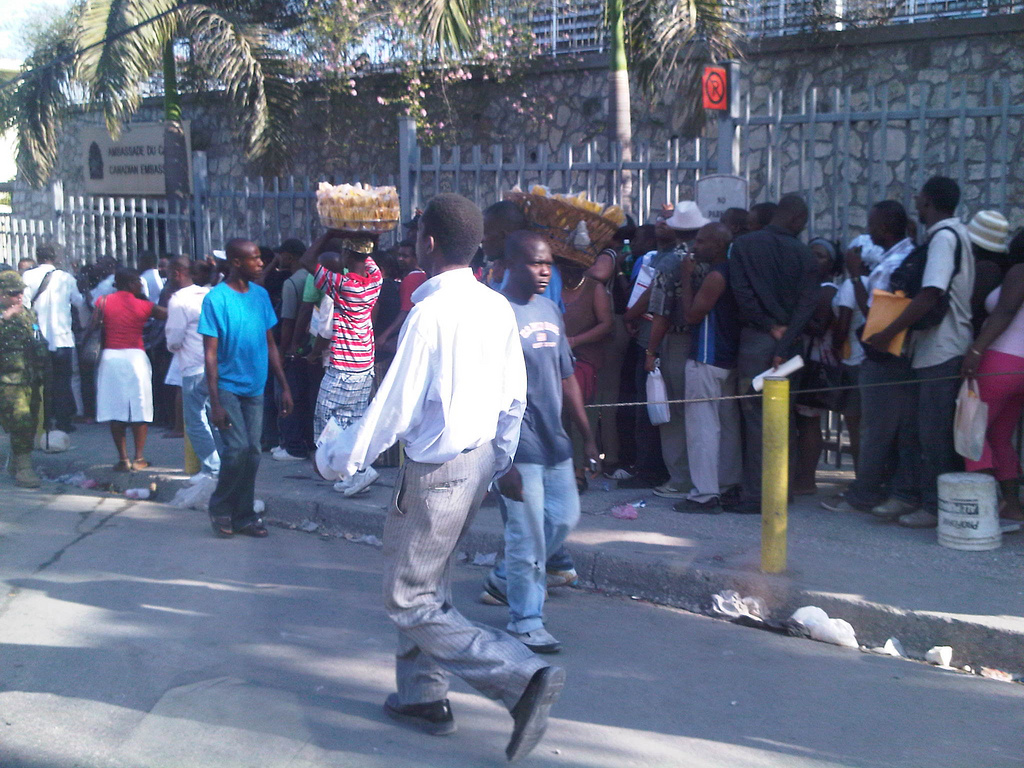“#HaitianLivesMatter- the overlooked crisis”
September 4 A sweeping deportation order will amount to more suffering for Haiti, writes Renice Bostic, 23, a Correspondent from Christ Church in Barbados, as she calls for international attention to the human rights crisis.
A sweeping deportation order will amount to more suffering for Haiti, writes Renice Bostic, 23, a Correspondent from Christ Church in Barbados, as she calls for international attention to the human rights crisis.
After shedding blood and sweat in the fight against slavery, and subsequently paving the way for its abolition, Haitians and their descendants are once again fighting injustice. It seems that the people of this small Caribbean nation continue to get the short end of the stick.
Growing up in Barbados and learning about the Haitian fight to become the first independent colony, then being forced to pay France for their freedom, it seemed to me that Haiti was being punished. In fact, it still feels that way.
Only a few months ago, France announced that it was cancelling Haiti’s debt from their lapse in payments for their freedom – a debt which in my opinion was morally unjustifiable and paved the way for Haiti’s development challenges. Yet, it was the right move to make on France’s part so we welcomed it. While we clapped our hands in the region that our sister island no longer had to shoulder that debt burden, we became complacent and unprepared for the next blow of injustice. News that over 200,000 Dominicans of Haitian descent are slated to be deported was brought to the forefront, and cancelled any celebratory dancing we indulged in.
It is true that States deport immigrants all the time, as they have the sovereign right to do. Yet, the situation in Haiti and the Dominican Republic is not so simple. The two countries share the land mass of Hispaniola in the north west of the island chain. Over the years, many Haitians have migrated across the border seeking better lives. The Dominican Republic Constitutional Tribunal’s establishment of laws, which state that anyone born to undocumented immigrants after 1929 is not entitled to Dominican citizenship, has resulted in the pending mass deportation.
Some of the potential deportees have never been to Haiti, having been born and raised across the border, and have no contemporary ties to the former French colony. Many therefore have no Haitian documentation, or Dominican birth certificates for that matter, having been intentionally prevented from being registered at birth. These are generations of families who can potentially become stateless. Innocent people who were born and raised in a country, who called the Spanish-speaking Dominican Republic home because that is all they have ever known, are being told they do not have the right to remain in their country. All of this, simply because their parents were undocumented migrants some eighty-five years ago. This is mass discrimination in its worst form.
Haiti is already struggling to provide for its population. Its GDP per capita is $1,490.86 (USD), only 22.5 per cent of its population live on more than $2 (USD) per day and just 27 per cent have access to electricity. Therefore, the World Bank and the United Nations classifies Haiti as a least developed country (LDC). This is a country that is still working hard to rebuild after a devastating earthquake in 2004, as well as countless other disasters such as severe hurricanes and cholera outbreaks. How are they to cater for an influx of 200,000 more, many of whom will be homeless?
Prime Minister of St. Vincent and the Grenadines, Dr. Ralph Gonsalves, has threatened that if the Caribbean Community (CARICOM) allows the induction of the Dominican Republic into the regional organization without fully addressing its current immigration policy, his country would leave. Yet, several other CARICOM countries have failed to make a statement condemning this law, or to take action against it in support of this bold declaration by Dr. Gonsalves. After all, Haiti is a CARICOM country, “one of us”; the Dominican Republic is still trying to be. As is often felt in the Caribbean, we don’t stand up for our own.
Since the recent shootings of African Americans by police in the United States, the Black Lives Matter campaign has been popularized, and even countered with #AllLivesMatter. If this is the case, then don’t Haitian lives matter? In fact, don’t the lives of Dominican-born, Haitian descendants matter? Where is the response of the international community to defend these innocent people? This is truly an international human rights crisis, but it has undoubtedly been overlooked.
Failure to take action to prevent the Dominican Republic from committing this unjustifiable act is the failure of humanity. For the people who fought valiantly for freedom from slavery and oppression, we must do better. They deserve better and so do their grand and great-grandchildren. Whether they are Haitian by birth or by descent, Haitian lives do matter.
photo credit: IMG00172-20100217-0850 via photopin (license)
…………………………………………………………………………………………………………………
About me: In 2005, I began working with humanitarian organizations and soon developed a passion for voluntary work. Several years and NGOs later, I am pursuing a career in international development, which lead me to pursue an LLM in International Law and Sustainable Development.
Prior to this, I worked as a journalist at The Barbados Advocate, with a B.A in Communication Studies and International Relations. When I’m not conducting research, I am performing (dance), writing, and travelling.
…………………………………………………………………………………………………………………
Opinions expressed in this article are those of the author and do not necessarily represent the views of the Commonwealth Youth Programme. Articles are published in a spirit of dialogue, respect and understanding. If you disagree, why not submit a response?
To learn more about becoming a Commonwealth Correspondent please visit: http://www.yourcommonwealth.org/submit-articles/commonwealthcorrespondents/
…………………………………………………………………………………………………………………




